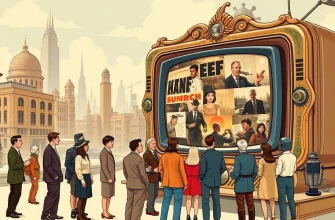In an era where television has become an integral part of our daily lives, it's fascinating to see how filmmakers envision its future. This curated list of 10 sci-fi films delves into the realm of television, exploring themes from dystopian control to virtual reality and beyond. Each film provides a thought-provoking look at how television might evolve, offering both entertainment and a reflection on our current media consumption habits. Whether you're a fan of speculative fiction or simply curious about the future of broadcasting, this collection promises to captivate and inspire.

Network (1976)
Description: While not strictly sci-fi, this satirical drama about a TV network's exploitation of a news anchor's mental breakdown for ratings offers a prescient look at the future of television and media ethics.
Fact: The film won four Academy Awards, including Best Actor for Peter Finch, who died before the film's release.
 Watch Now
Watch Now
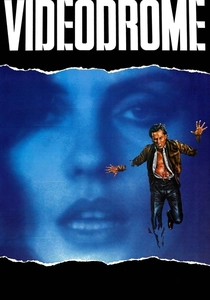
Videodrome (1983)
Description: A chilling exploration of the effects of television on the human psyche, where a TV executive discovers a mysterious broadcast that blurs the line between reality and hallucination, leading to a descent into madness.
Fact: David Cronenberg, the director, has said that the film was inspired by his own fears about the influence of television on society.
 Watch Now
Watch Now
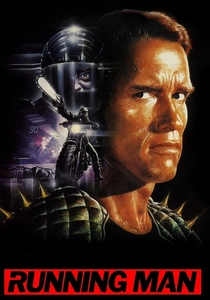
The Running Man (1987)
Description: In this dystopian future, television has become a tool for government control, with the most popular show being a deadly game show where contestants must evade a team of killers. This film is a stark warning about the potential for media to manipulate and control the masses.
Fact: The film was loosely based on a novel by Stephen King (under the pseudonym Richard Bachman). Arnold Schwarzenegger's character was originally meant to be a black man in the book.
 Watch Now
Watch Now
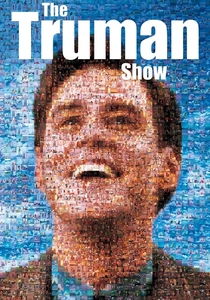
The Truman Show (1998)
Description: This film explores the concept of a man whose entire life is broadcast as a reality TV show without his knowledge, raising questions about privacy, reality, and the voyeuristic nature of television.
Fact: The set for Seahaven, the town where Truman lives, was built on an old military base in Florida.
 Watch Now
Watch Now

eXistenZ (1999)
Description: This film explores a world where virtual reality games are broadcasted like TV shows, blurring the lines between game and reality, and questioning the nature of entertainment.
Fact: David Cronenberg directed this film, continuing his exploration of body horror and technology.
 Watch Now
Watch Now

The Matrix (1999)
Description: Although not directly about television, the Matrix itself can be seen as a form of virtual reality TV, where humans are kept in a simulated reality to keep them docile while their bodies are used as energy sources.
Fact: The Wachowskis developed the film's concept over several years, drawing inspiration from various philosophical and cyberpunk sources.
 Watch Now
Watch Now
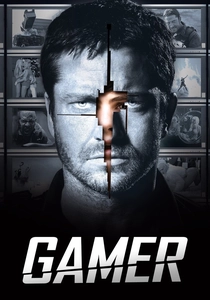
Gamer (2009)
Description: In a world where players can control real people in a game show, television has evolved into a platform for extreme reality shows, raising ethical questions about consent and entertainment.
Fact: The film was co-written by Mark Neveldine and Brian Taylor, who also directed the "Crank" series.
 Watch Now
Watch Now
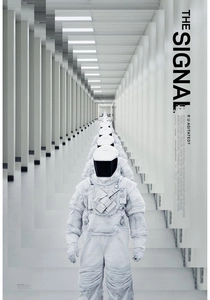
The Signal (2014)
Description: A sci-fi thriller where a mysterious signal disrupts reality, and television plays a role in the unfolding mystery, showcasing how media can be a conduit for unexpected phenomena.
Fact: The film was shot in sequence to help the actors maintain continuity in their performances as their characters' realities shifted.
 Watch Now
Watch Now

Brazil (1985)
Description: In this surreal dystopia, television serves as a tool of distraction and control, with the protagonist's escape into his own fantasies often interrupted by the omnipresent TV screens.
Fact: The film's title is a reference to the song "Aquarela do Brasil," which plays during the opening credits.
 30 Days Free
30 Days Free
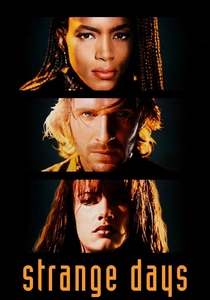
Strange Days (1995)
Description: Set in the near future, this film features a technology that allows people to record and experience others' memories, turning television into a personal, immersive experience.
Fact: The film was directed by Kathryn Bigelow, who would later win an Oscar for "The Hurt Locker."
 30 Days Free
30 Days Free







